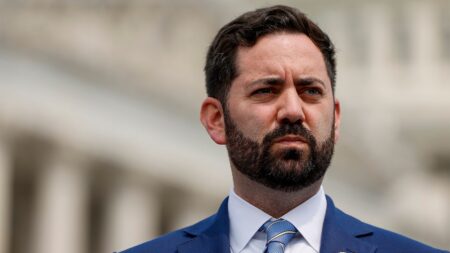Every time law enforcement closed in, Mani Chulpayev made them an offer they couldn’t refuse.
The longtime mobster of Russian descent discovered early on that by offering to become an informant, he could usually buy his way out of the most serious repercussions from the various criminal enterprises he had been involved with in the United States over the past 25 years.
For much of that time, federal prosecutors say Chulpayev ran an elaborate luxury-car-theft ring in Atlanta that involved stealing millions of dollars’ worth of Aston Martins, Maseratis, Lamborghinis and Porsches and renting them to drug dealers and rappers, meaning that his information was considered highly valuable.
But his informal relationships with investigators would eventually prove problematic, federal prosecutors say. A decade ago, charges brought against Chulpayev by the Fulton County district attorney in the murder of an up-and-coming rapper named Lil Phat were dropped because of his relationship with an FBI agent that compromised the case, according to court filings.
Now, after years of staying one step ahead of prosecutors, even fleeing to Ukraine under a false identity, Chulpayev, 46, was finally sentenced last week to 10 years in prison for the theft of 115 superluxury cars worth $9 million.
“Chulpayev is a consummate schemer at heart. He left behind a promising start in life with limitless potential and, despite multiple second chances, has repeatedly chosen to channel his intellect and financial acumen into a career of crime and manipulation,” federal prosecutors in Atlanta wrote in court filings.
Messages left with Chulpayev’s attorney weren’t immediately returned.
Learning the game
Chulpayev was born in the Soviet Republic of Uzbekistan. After the dissolution of the Soviet Union, he and his family moved to Queens, N.Y., when he was 12 years old.
Prosecutors say his father ran a successful business operating street-vendor carts and sent his son to private school. But Chulpayev soon fell in with a rough crowd of Russian gangsters.
Sometimes going by the names Mani Chilpayen or Immanuel Cohen, Chulpayev became the ideas man behind a ruthless Russian gang known as “the Brigade,” according to court documents. The group specialized in extorting Russian small businesses and in Medicaid and green-card fraud and other white-collar crimes. Chulpayev also became involved in human trafficking, smuggling women from the former Soviet Union to the United States to work as prostitutes, prosecutors said.
Business owners who didn’t pay saw their stores burned down or their loved ones kidnapped, court documents showed.
Eventually, authorities caught on to what the Brigade was up to and began building a case against its members. When they came to Chulpayev with evidence of human trafficking, he flipped, according to court papers. It turned out he had kept copious notes that investigators said were “like the Rosetta stone of the gang’s activity” and proved instrumental in taking the gang down.
In return for his extensive cooperation, Chulpayev was sentenced to time served and placed in witness protection. That result would become a pattern for Chulpayev.
“When caught, his typical move is to offer to cooperate and, like most things, he is exceptionally good at it. He is well connected, keeps intricate records and knows exactly what kind of information would be hard for an agent to pass up,” prosecutors wrote in court filings.
His cooperation was considered so unusual in a mob case that he became the focus of a 2002 profile in the New York Times.
At that point, he relocated to Atlanta, where prosecutors say that within two years he became involved in an ring of automobile chop shops. When that was busted by law enforcement, Chulpayev dimed out his co-conspirators again in return for a comparatively light 30-month sentence, court papers said.
Operating Riding Dirty
Chulpayev began moving into the big leagues with the car-theft scam starting in 2009, prosecutors said. The scheme was elaborate and enabled him to play both sides of the law as needed, they said.
He would begin by convincing investors with clean credit to serve as straw buyers of luxury cars. Prosecutors say Chulpayev sold the scheme by telling investors all they had to do was sign a loan — sometimes for as much as $75,000. He would then find someone to lease the car to cover the note, and Chulpayev would pay the investor a percentage every month.
But prosecutors say Chulpayev would usually stop paying the loan after a few months, sticking the investor with the payment. In some cases, investors agreed to take out loans on multiple cars at once, quickly pushing them into bankruptcy and demolishing their credit.
At the same time, prosecutors say Chulpayev would rent many of the cars to big-time drug traffickers who liked having high-end cars that were registered in someone else’s name so they could stay under the radar. They also liked being able to pay cash in order to launder their drug proceeds, prosecutors said.
Chulpayev’s clients also included rappers and athletes, according to court documents.
When law enforcement caught on to the scam, they launched an investigation dubbed Operation Riding Dirty. But when they zeroed in on Chulpayev, he offered them his help.
As part of doing business, he placed tracking devices on all his cars and offered that information to investigators so they could easily locate drug traffickers they were looking for. The arrangement led to several arrests and successful prosecutions, according to court filings.
“Chulpayev turned out to be the hidden link in a web of seemingly unconnected drug traffickers driving around Atlanta in constantly changing hard-to-trace cars, rappers and athletes, desperate investors who were talked into buying Aston Martins, Lamborghinis and other luxury cars they couldn’t afford, and, lurking in the background, compromised law enforcement officers,” prosecutors wrote in court documents.
Lil Phat
In 2012, a 19-year-old Louisiana rapper named Lil Phat was fatally shot outside a Georgia hospital where he was awaiting the birth of his daughter. Born Melvin Vernell III, Lil Phat had made a name for himself performing with Baton Rouge rappers Webbie and Lil Bousie.
But prosecutors say he had also run afoul of a group of drug dealers that included former college-basketball standout Decensae White and Atlanta rapper Gary “Eldorado Red” Bradford, who thought Lil Phat had stolen 10 pounds of marijuana from them.
According to court documents, White and Bradford hired two gunmen, Deandre Washington and Maurice Connor, to kill Lil Phat. They were able to locate him using tracking info provided by Chulpayev, who had rented the rapper a car.
All five men were eventually charged with conspiracy to commit murder, including Chulpayev, court documents show.
Ultimately, Washington was convicted of the slaying and sentenced to life in prison. Connor and Bradford were convicted of conspiracy and sentenced to 30 years and 25 years, respectively. White pleaded guilty to a lesser charge and received an eight-year sentence for agreeing to testify against the others, court documents show.
While the convictions were a feather in the cap of local prosecutors, Chulpayev’s role turned into a black eye for law enforcement.
Charges against him were eventually dropped because of his relationship with an FBI agent whom Chulpayev had allegedly given a key tip that led to the arrest of the other four men, according to court documents.
His attorneys said Chulpayev had been a longtime source for the agent, and that he had given him the information with the understanding that he was serving as a confidential informant and that the information couldn’t be used against him.
Chulpayev’s lawyers also claimed their client had given the FBI agent gifts of cash and jewelry over the years, compromising his integrity. This led the Department of Justice’s Office of the Inspector General to open an investigation and ultimately resulted in Chupayev’s statements being thrown out, deep-sixing the case against him, according to court filings.
To Ukraine and back
By 2016, federal prosecutors had grown tired of Chulpayev and were working on building a case against him for the car-theft ring. But Chulpayev had one more trick up his sleeve.
According to court documents, Chulpayev had cultivated a relationship with Robert Bentivegna, a detective with the police department in Dunwoody, Ga., who served on a U.S. Secret Service task force and was having financial difficulties.
Over time, Chulpayev began giving Bentivegna airline tickets and luxury cars for his children to use. When one of the officer’s children got into legal trouble, Chulpayev paid his legal fees, prosecutors said.
In exchange, prosecutors said Chulpayev asked Bentivegna to keep an eye on a law-enforcement database and inform him if any warrants for his arrest had been filed or if there were any other signs that he was under investigation. Bentivegna would later be convicted of federal computer-access crimes and sentenced to two months in prison.
In 2016, Chulpayev learned from Bentivegna that the feds were getting ready to file charges, so he fled to Mexico, where he paid $25,000 for a phony Israeli passport in the name of Vitaliy Bylyenko, court documents show.
Using that identity, Chulpayev flew to Russia and later relocated to Ukraine, where he quickly went into business as a movie producer. According to court documents, by the time U.S. authorities caught up with him in 2019, he was earning $500,000 a year making films.
After his arrest by Ukrainian authorities, Chulpayev fought extradition and was held in prison in Kyiv for a year before losing his case and being shipped back to the U.S. to face charges.
This time, prosecutors say Chulpayev realized that his pattern of trying to cooperate with authorities in return for leniency was no longer going to work, so he decided to fight the charges against him. Late last year, just before the case was set to go to trial, Chulpayev agreed to plead guilty.
Read the full article here












